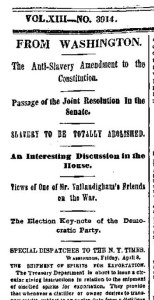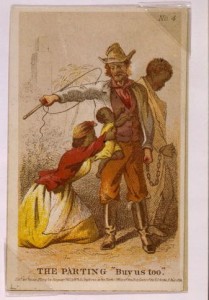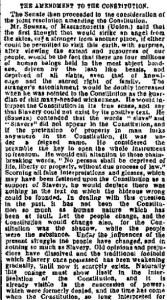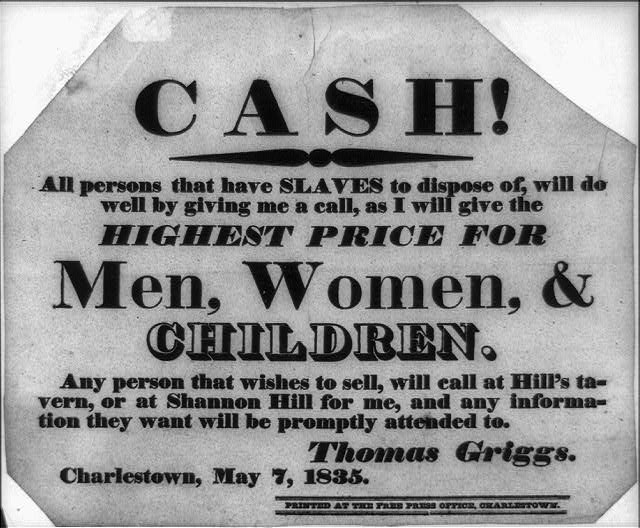150 years ago today the first Constitutional step was taken to amend the Constitution regarding slavery. The United States Senate passed a resolution to make the Constitution explicitly forbid slavery throughout the United States. The Thirteenth Amendment would eventually become law in December 1865. In the debate on the resolution Charles Sumner said a visiting angel or any other stranger to earth would be shocked at 4 million people in bondage, “driven by the lash like beasts, and deprived of all rights, even that of knowledge and the sacred right of family. The stranger’s astonishment would be doubly increased when he was pointed to the Constitution as the guardian of this many-headed wickedness.”
The Harper’s Weekly of April 23, 1864 (at Son of the South) focused on the arguments of the senators who voted against the resolution:
THE AMENDMENT TO THE CONSTITUTION.
ON the 8th of April, 1864, at the close of the third year of a civil war produced by the tragical and futile effort to unite in one peaceful government the principle of the fullest popular freedom and of the most abject despotism, the Senate of the United States, by a vote of thirty-eight to six, proposed to amend the Constitution in the manner itself provides, for the purpose of prohibiting slavery in the United States. That nothing might be wanting to the moral grandeur and dignity of the occasion, the resistance offered to this truly American act by the truly un-American advocates of human slavery was as contemptible as the system itself is revolting.
Of the six Senators who voted against the resolution four made brief speeches. Mr. POWELL, of Kentucky, said that if there had been no Abolitionists there would have been no rebellion : an inanity too incredible. Mr. SAULSBURY, of Delaware, proposed to secure liberty of speech and of the press; and reestablish the principles of the Missouri Compromise—which was a proposition to feed a fire with water. For how can slavery and free speech coexist? Mr. DAVIS, of Kentucky, declared the constitutional abolition of slavery a wicked and unjust act, against which he was aware the protest of an angel would be of no avail ; forgetting that the only angel who would have wished to protest was named LUCIFER, and fell from heaven. Mr. M’DOUGALL, of California, announced that he was devoted to human freedom, and therefore, as a true friend of man, should vote in favor of slavery.
And this was the expiring gasp in the United States Senate of the infernal iniquity to whose service the clear, cold casuistry and subtle sophistry of CALHOUN was formerly devoted ; before which WEBSTER used to bow ; from whose snare the human-hearted CLAY could never break away; which, by the universal obsequiousness of the American people, had succeeded in coiling its horrid folds around all our liberties, and from whose fatal embrace this war is the struggle of the national life to escape. Yet that final escape is worth the war. The innumerable hearts that are broken, the countless homes that are desolate in our own land, and the earnest friends in other countries who understand the scope of the struggle, will own that when the great act initiated by the Senate is completed, the costly sacrifice of youth and hope and love is not in vain, and that the future of equal justice which this measure secures is well bought by all the blood and sorrow of the war.
The issue is at last openly joined. If the House fail to concur by the necessary two-thirds vote, the Congressional elections of next autumn will turn upon the question of the Constitutional Amendment, and the vote of this spring shows what the result will be.
In the South April 8, 1864 was observed “as a day of humiliation, fasting, and prayer.”
From the Richmond Daily Dispatch April 11, 1864:
Day of fasting and prayer.
–As far as could be judged from outward appearances, Friday was universally observed in this city in accordance with the suggestions of the President’s proclamation. All places of business were closed, and there was divine service in all the churches at the usual hour of the morning.
At 8 o’clock, P. M., the Rev. Dr. J. L. Burrows, of the Baptist church, preached at the Theatre to an immense audience, among whom were a great number of ladies. In a few minutes after the doors were opened, every seat and every available foot of space in the building was occupied, and it is estimated that between eight hundred and a thousand persons were turned away from the doors, being unable to gain admittance because of the crowd. Dr. Burrows delivered a discourse of an hour and a quarter in length, from XXVI. Leviticus, 23, 24.
From Leviticus 26:
23 And if ye will not be reformed by me by these things, but will walk contrary unto me;
24 Then will I also walk contrary unto you, and will punish you yet seven times for your sins.




